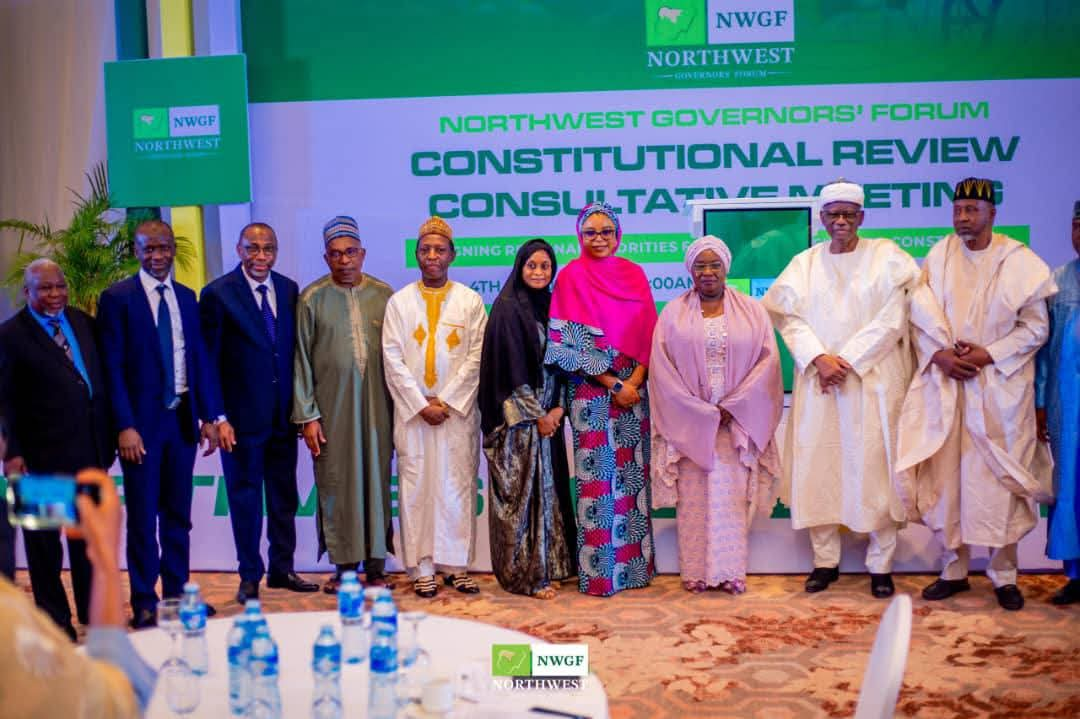NNDC Chairman Urges Constitutional Recognition of Regional Development Bodies at Northwest Governors’ Forum

Calls for Balanced Revenue Allocation, Local Government Autonomy, and Infrastructure Reform
ABUJA – The Chairman of the Northern Nigeria Development Commission (NNDC), Alhaji Lamis Shehu Dikko, has called for constitutional amendments that would formally recognize regional development agencies and address structural imbalances in Nigeria’s federal system.
Speaking on Monday during the Northwest Governors’ Forum Constitutional Review Consultative Meeting in Abuja, Alhaji Dikko outlined a series of proposals aimed at creating a more equitable federation. He advocated for stronger local government autonomy, a revised revenue allocation formula, and constitutional empowerment of regional institutions such as the NNDC and ODUA.
“The North seeks no favour beyond fairness, and no privilege above parity,” he said while addressing the gathering, which included governors, constitutional experts, and other stakeholders from the Northwest region.
Among the key proposals, Alhaji Dikko called for a restructured federal framework in which states would assume legislative authority in critical areas such as policing, agriculture, prisons, and mineral resources. He argued that the current Exclusive Legislative List should be streamlined, with more powers devolved to states.
On revenue allocation, he criticised the existing formula as unjust to states lacking natural resources. He emphasized the need for reforms that uphold the principles of national equity and fairness.
Alhaji Dikko also pressed for legal recognition of regional economic bodies. “While the NNDC and other regional development companies such as ODUA should be granted constitutional recognition as regional development bodies empowered by law to coordinate regional enterprises and industrialisation with federal support,” he said.
He raised concerns over infrastructure development, particularly the long-delayed commissioning of the 255MW Kudandan/Kaduna Power Plant. Developed under the National Integrated Power Projects (NIPP), the plant is intended to supply electricity to the Kaduna-Kano-Katsina industrial corridor and stabilise the Northern transmission ring. Dikko called on Northern governors to directly engage the President to ensure its completion.
Calling for regional unity, Dikko urged stakeholders to use the constitutional review process as an opportunity to reunite the North, despite what he described as “unconstitutional artificial fragmentation into North East, North Central and North West.”
He proposed the creation of a Technical Working Group to formulate actionable proposals and called on Northern members of the National Assembly to prioritise regional interests.
“We must show the nation what unity looks like. Let us demonstrate that regional pride and national loyalty are not in conflict,” Dikko said.
Also speaking at the forum, Professor Muhammed Tawfiq Ladan, former Director General of the Nigerian Institute of Advanced Legal Studies, presented a technical analysis of proposed constitutional amendments and their implications for the Northwest region.
Professor Ladan highlighted both consensus and divergence among the seven Northwest states on key constitutional issues. He noted widespread support for the creation of state police, with the exception of Sokoto State, which preferred centralised policing for national cohesion.
He recommended a “balanced policing model” that would permit state police in supportive states while maintaining federal oversight mechanisms.
On fiscal matters, Ladan said most states support revising the current revenue-sharing formula. He cited Katsina State’s proposal of a new formula—Federal Government (45%), States (31%), and Local Governments (24%)—as a workable suggestion. Sokoto, however, rejected resource control, favouring national pooling of revenues.
Professor Ladan further observed strong support across the Northwest for local government autonomy and direct funding, with widespread rejection of federal oversight through a National LG Electoral Commission.
He identified selective interest in devolving specific powers from the Exclusive List to the Concurrent List. For instance, Kaduna supports transfer of railways, Kebbi supports mining, and Jigawa supports labour and minimum wage. Sokoto favours devolution in areas like tourism and quarantine, but opposes transfer of natural resource control.
Ladan proposed a phased reform strategy that begins with devolution in low-risk sectors such as agriculture, tourism, and intra-state rail, allowing states to gradually strengthen their governance capacity.
He concluded that bipartisan cooperation, clearly drafted legislative proposals, and strong implementation safeguards will be crucial to successful constitutional reform.
The consultative meeting, held under the theme “Aligning Regional Priorities for a People-Centred Constitution”, continues as stakeholders work to form a common Northwest position on constitutional reforms.

